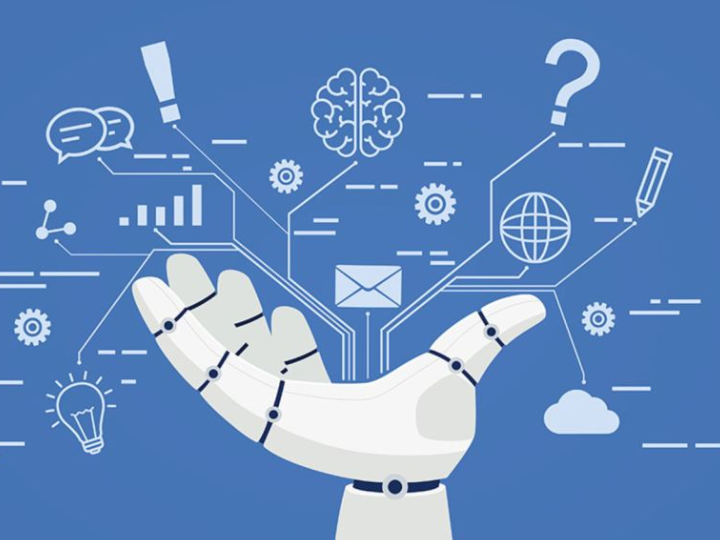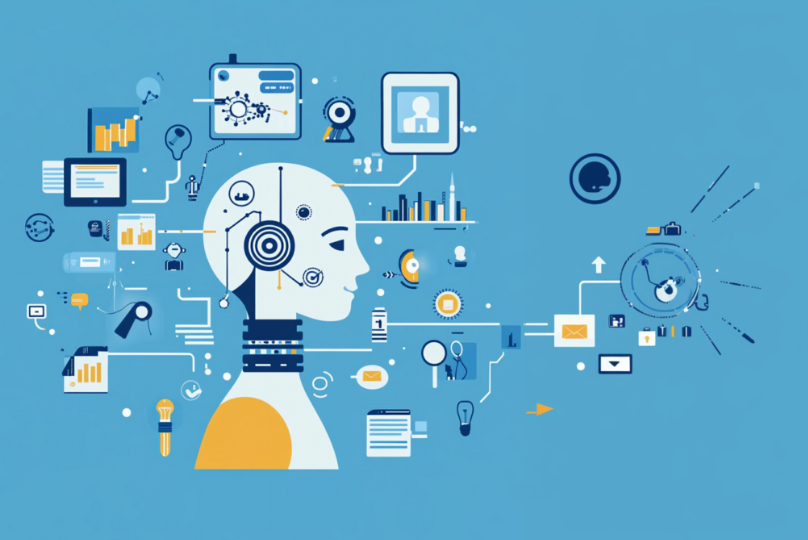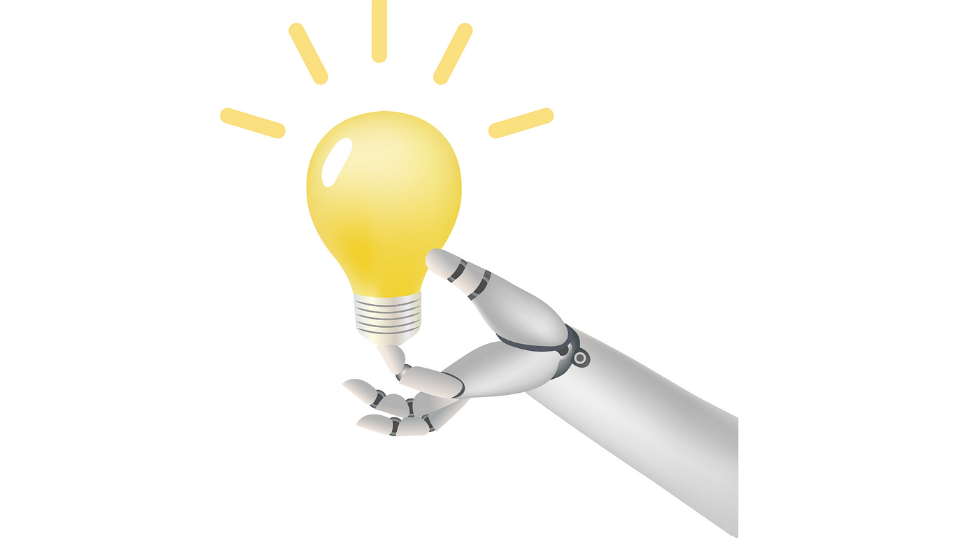Introduction to AI in Marketing
Marketing: The increased use of artificial intelligence (AI) is a powerful tool that is revolutionizing the marketing field of various companies. Marketing departments should integrate AI since it assists in eliminating information that is difficult to analyze. This increases relevancy within marketing communications, better offering the chance of capturing the consumer’s attention and having more relevant material to them. More significant data spectra can easily be scanned through to give possible patterns that a human may overlook quickly.
Also, a good example of using AI to fill the self-assembly opportunities is Personalization in creating a unique customer experience. It can personalize recommendations based on past activity or anticipated future requirements and consummate interactions that are more relevant to the consumer. This level of customization is becoming critical, especially given emerging consumer expectations that are often quite specific when interacting with brands they choose to deal with.
The last essential ingredient is the ability to automate many of the tedious tasks that are performed in marketing. AI can organize email marketing emails, divide audiences, and respond to clients’ questions with the help of bots. BasiC Process speeds up the work and guarantees uniformity and a high level of work; thus, marketers can focus on effective planning and creativity.
AI also provides correct analytical options for the marketer’s performance and helps accurately measure the campaign’s effectiveness. Differences in performance give the business great chances of making real-time adjustments to its marketing campaigns. Predictive analytics, a part of AI, goes a step ahead of this by predicting future trends/behaviours, giving companies an edge.
AI technology is growing very fast, which means that marketing will progress even further as ways are discovered to interact with and analyze customers. This makes AI an imperative in organizations’ contemporary marketing communication campaign approaches.

Enhancing Customization
AI technology allows marketers to create experiences that genuinely speak to individual customers. By diving deep into data, AI can determine the content most engaging for each person. Whether recommending products that match past purchases or sending personalized email offers, AI helps tailor interactions to fit unique preferences. This captures attention and makes customers feel valued, fostering a deeper connection with the brand.
Marketers can leverage AI to segment their audience more precisely than ever before. By analyzing behaviours, demographics, and real-time interactions, AI identifies sub-groups within a larger audience, allowing for hyper-targeted campaigns. This means that it is easy to target the marketing messages to meet the needs and wants of the particular segment, thus higher conversion rates.
Moreover, it makes it possible to employ so-called dynamic content, especially on websites. He said it could change the layout of web pages and ads and even recommend products in real-time according to user behaviour. For example, if a visitor frequently views a particular category of products, the website can highlight those items more prominently in future visits. It also guarantees customers receive only the correct information circulating online, transforming their experience into the best.
Another primary utilization of AI in the delivery of customization is sentiment analysis. Based on collected data of posts and comments, ratings, and other content created by other users, an AI can check trends and align its marketing strategies. This is helpful in branding because brands are put where they must fit in consumers’ perceptions and conduct accordingly.
With the help of AI, it becomes possible to create genuinely individualized interaction between the buyer and the company, increasing the likelihood of interacting with the brand and sticking to it.
Automating Marketing Operations
Artificial intelligence has drastically changed how marketing tasks are handled by saving time and increasing efficiency. Communication tools such as emails and social media, system automation, and audience segmentation tools exist. These help free marketers to focus on core work practices. For instance, many firms apply chatbots in their customer support systems, meaning such systems can answer questions without involving any human. This means there will always be time to attend to the customer’s needs because the interaction time will be perfectly timed, hence increasing the satisfaction level of the customers.
There is no better place for automation than placements like ad placements. AI can identify the appropriate time and space to place the advertisement so that it will have the highest impact possible. This reduces most of the risk people usually experience in other advertising activities. In addition, dynamic content generation allows changing the marketing content during campaigning based on consumers’ feedback and trends.
AI can also be helpful for many more time-consuming actions, such as lead analysis or communication. Based on multiple factors, AI can sort leads in terms of their potential to become customers and direct sales teams to those prospects where their efforts will be most effective.
Further, reporting and analytical tools are automated and reveal some of the campaign’s performance to the marketers so that they can change the strategies as soon as possible. These advancements collectively make marketing operations more efficient and impactful.
Data-Driven Decision-Making
AI facilitates the marketer in analyzing large amounts of information within the shortest time possible and converting the information into knowledge. Its advantage is that it can calculate numerous parameters, giving a better understanding of campaign metrics and customers.
Hence, AI can tell when something is ‘brewing,’ whereas, in standard templates, there is no way of predicting these elements or pointing them out in the future. This type of information helps organizations to be prepared to respond to constantly shifting organizational and market demands and customer needs and aspirations in the future.
AI-based analysis also assists in identifying the direct use of indicators for subsequent use for measuring business performance and making changes based on the outcome. This means that by using data at this level, marketing managers can make more effective decisions regarding resource allocation and enhance their campaigns’ efficiency.
This way of decision-making contributes to creating an organizational culture of continuous reconsideration of the strategies used with reference to the data received. This, in turn, says that AI can assist in splitting the audiences more successfully with the details of how to administer the promotion according to clients’ identified characteristics. Thus, companies can introduce more efficient and effective campaigns that benefit from improved rates and engagement.
Predictive Analytics for Campaign Achievement
Predictive analytics, driven by AI, enables marketers to anticipate future trends and consumer behaviours accurately. Thus, using statistics, AI determines what might happen next, and businesses can use this knowledge to predict changes in the market. This capability is indispensable for marketing communication planning and for comparison with the target consumer’s behaviour.
It aids in formulating the correct budgets needed as it applies the possible future revenue figures to bring the highest amount of worth for promising sectors. It also assists in identifying which sectors or sectors will probably experience the most development so that marketers may narrow down their attempts in a particular route most suitably.
For instance, by identifying those parts of a particular audience most responsive to a specific campaign, marketers can adjust their tactics to those parts of the audience and, thus, increase interaction and conversion.
In addition, predictive analytics also helps more effective resource management by determining the right time for a specific campaign and selecting the right media to deliver a message. Its implementation in marketing means that such a strategy is not only timely but also situated in the best possible conditions.
Also, such a type of BI is helpful in risk management, as it can signal when a particular problem may evolve into a significant issue. Knowing all those risks, companies would be able to prevent rises and guarantee problem-free campaign implementation. This proactive approach goes a long way toward improving the general effectiveness of marketing strategies and makes predictive analytics very useful in developing today’s marketing approaches.
Challenges and Ethical Issues
AI’s integration into marketing introduces several challenges and ethical issues that need addressing. One of the primary concerns is data privacy. As AI systems often rely on large volumes of consumer data, ensuring this information is collected, stored, and used responsibly is paramount. Mutual and individual utilization or poor data management results in large-scale privacy infringements, adversely affecting consumer confidence and business image.
Discrimination is another ethical concern because the AI algorithm may have some preconceptions about the technology involved. If the data fed into AI systems is biased, the outputs will likely be biased, leading to unfair targeting or exclusion of certain groups. This not only raises ethical questions but can also result in legal consequences.
Transparency is another crucial aspect. Consumers should be aware when AI is being used to influence their purchasing decisions. Lack of transparency can lead to mistrust and backlash against brands.
Additionally, the balance between automation and human oversight must be carefully managed. Concerning the second area, one needs to understand that although AI is good at managing many processes and solving various problems, monitoring compliance with generally accepted ethical standards and business values in marketing should be left solely to people.
Last but not least, the increasing speed at which AI is being developed and deployed means that marketers must constantly learn and ‘keep up’ with such technologies to ensure that AI is being used in a reliable, efficient, and, importantly, ethical manner.
Future Prospects of Marketing with AI
AI is predicted to change marketing even more, with several upcoming significant developments in the pipeline. Some of them are more surprising: for example, one of the existing trends is the expansion and integration of AI in content creation – in other words, the use of AI tools to create an unlimited amount of high-quality content with partially tailored messages.
Another souring factor is voice search optimization, destined to gain much popularity among customers availing voice search gadgets to find products or services. Moreover, social and marketing applications of virtual and augmented reality experiences given by AI will provide consumers with more effective and engaging branding techniques.
In the future, they will hold new developments in these areas for marketers to aid in developing proper strategies and to create a satisfying customer experience.



